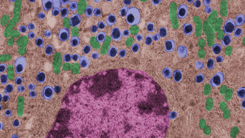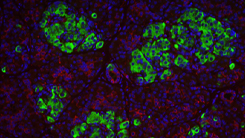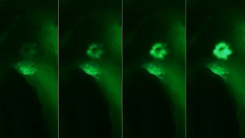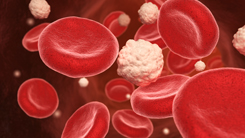HOW CAN WE HELP YOU? Call 1-800-TRY-CHOP
De León-Crutchlow Laboratory
The De León-Crutchlow translational research laboratory studies disorders of insulin regulation with a particular focus on hyperinsulinemic hypoglycemia. Working in tandem with clinicians in the Congenital Hyperinsulism Center, the lab takes a bench to bedside approach by evaluating novel genetic etiologies, exploring the pathophysiology of known disorders, with the ultimate goal of developing better and more effective therapies.
The De León-Crutchlow lab employs multiple methods to uncover novel molecular mechanisms associated with hyperinsulinism, including next generation sequencing of DNA isolated from blood and/or pancreatic surgical specimens. Novel findings are characterized primarily through functional analysis of pancreatic islets from surgical specimens, in vitro studies of the identified mutations, and phenotypic characterization of carriers of the mutations.
A second area of focus in the lab is the study of the mechanisms of insulin secretion and identification of novel insulin secretion modulators. One of the lab's projects evaluates the capacity of ion channels, Kv7.1 and TMEM16A, to modulate insulin secretion in pancreatic β-cells under physiologic and pathologic conditions. Another project focuses on the effect of hypoxia and the role of HIF1 on early post-natal pancreatic islets.
Often studies require the creation of new models to advance research capabilities, and the lab's efforts have led to the creation of several novel models of hyperinsulinism. Current models in development include insulin receptor mutant cell lines, a β-cell specific KCNQ1 deletion mouse line, and a hyperinsulinemic zebrafish model that allows for in vivo analysis of insulin secretion.
Translating all the knowledge gained through research and developing it into better treatment options for patients is the De León-Crutchlow lab's paramount mission. The lab team works directly toward these goals through studying the efficacy of potential new therapies. Two examples of this strategy include the team's study of the ability of glucagon like peptide 1 receptor (GLP-1R) targeted therapies and selective somatostatin 5 receptor agonists to alleviate fasting hypoglycemia in the Sur1-/- hyperinsulinemic mouse model.

Research Highlights
Dr. De León-Crutchlow's team identifies novel therapeutic targets and new therapies through lab and patient-oriented research.
-
Study of the Insulin Secretion Pathways and Mechanisms of Insulin Secretion

-
Identification of Novel Genetic Etiologies of Congenital Hyperinsulinism

-
Development of New Models of Congenital Hyperinsulinism

-
Development and Testing of Potential Novel Therapeutics for Congenital Hyperinsulinism

-
Human Clinical Trials and Related Projects


Diva D. De León-Crutchlow, MD, MSCE
Chief, Division of Endocrinology and Diabetes
Dr. De Leon-Crutchlow’s translational research program focuses on examining the pathophysiology of disorders of insulin regulation, identifying novel therapeutic targets, and developing new therapies for these conditions. The program approach includes patient-oriented research and bench research employing mouse models and primary islet cultures.